|
Featured picture tools: |
These featured pictures, as scheduled below, appeared as the picture of the day (POTD) on the English Wikipedia's Main Page in May 2019. Individual sections for each day on this page can be linked to with the day number as the anchor name (e.g. [[Wikipedia:Picture of the day/May 2019#1]] for May 1).
You can add an automatically updating POTD template to your user page using {{Pic of the day}} (version with blurb) or {{POTD}} (version without blurb). For instructions on how to make custom POTD layouts, see Wikipedia:Picture of the day.Purge server cache
May 1

|
When added to glass, thorium dioxide helps increase its refractive index and decrease its dispersion. Such glass finds applications in high-quality lenses for cameras and scientific instruments. The radiation from these lenses can darken them and turn them yellow over a period of years and degrade film, but the health risks are minimal. Yellowed lenses may be restored to their original colourless state by lengthy exposure to intense ultraviolet radiation. Thorium dioxide has since been replaced by rare-earth oxides such as lanthanum oxide in almost all modern high-index glasses, as they provide similar effects and are not radioactive. This picture shows a yellowed thorium dioxide lens (left), a similar lens partially de-yellowed with ultraviolet radiation (centre) and a lens without yellowing (right). Photograph credit: El Grafo
Recently featured:
|
May 2

|
The Madonna of Loreto is an oil-on-panel painting by the Italian High Renaissance painter Raphael, completed around 1511. The painting shows the Christ Child with his mother, Mary, as well as her husband, Saint Joseph. Just awakened, Jesus is playing a game with his mother's veil. Joseph is shown on the right, looking in from the shadows. Scholars have determined through X-ray analysis that Joseph was added as an afterthought, his image being painted over a window that was previously visible over Mary's shoulder. Furthermore, the change in the position of Jesus's right foot was also revealed via X-ray. These changes align with Raphael's preliminary drawings for the painting. The painting is now in the collection of the Musée Condé in Chantilly, France. Painting credit: Raphael
Recently featured:
|
May 3

|
The Basaltic Prisms of Santa María Regla are tall columns of basalt near Huasca de Ocampo in the Mexican state of Hidalgo, lining a ravine through which water runs from the San Antonio Dam. The walls of the canyon, called the Barranca de Alcholoya, are lined by polygonal columns between 30 and 50 metres (98 and 164 ft) high, with five or six sides each. The basalt columns were created by the slow cooling of volcanic lava. There are two waterfalls at the site. The canyon has been improved by the addition of stairs, walkways and hanging bridges for easier access. Photograph credit: Diego Delso
Recently featured:
|
May 4
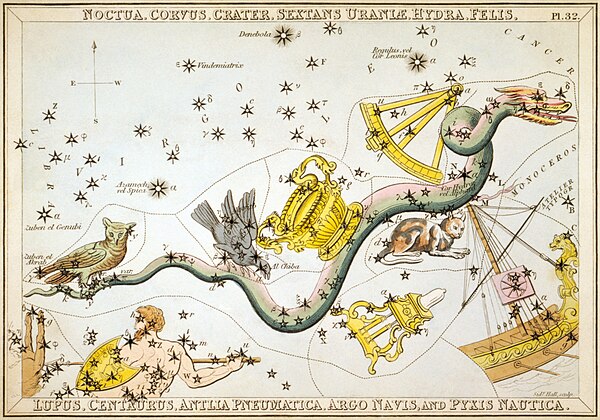
|
|
Hydra is a constellation in the southern celestial hemisphere, commonly represented as a water snake. The largest of the 88 modern constellations, it stretches more than 100 degrees across the sky. Its southern end abuts Libra and Centaurus, while its northern end borders Cancer. It was included among the 48 constellations listed by the 2nd-century astronomer Ptolemy. Despite its size, Hydra contains only one moderately bright star, Alphard, designated Alpha Hydrae, which is an orange giant of magnitude 2.0, 177 light-years from Earth. Other stars include Beta Hydrae, a blue-white star of magnitude 4.3, as well as Gamma Hydrae, a yellow giant of magnitude 3.0. Hydra contains three Messier objects: M83, also known as the Southern Pinwheel Galaxy, located on the border with Centaurus; M68, a globular cluster near M83; and M48, an open cluster at the western end of the constellation. This illustration was produced around 1823 and comes from Urania's Mirror, a set of 32 astronomical star chart cards. Along with Hydra, the chart also depicts the constellations of Noctua (obsolete), Corvus, Crater, Sextans Uraniae (now Sextans), Felis (obsolete), Lupus, Centaurus, Antlia Pneumatica (now Antlia), Argo Navis (obsolete) and Pyxis Nautica (now Pyxis). Lithograph credit: Sidney Hall; restored by Adam Cuerden
Recently featured:
|
May 5
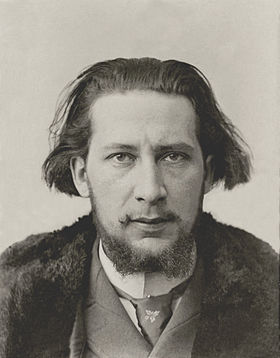
|
Albert Aurier (1865–1892) was a French poet, art critic and painter, associated with the Symbolist movement. The son of a notary born in Châteauroux, Aurier went to Paris in 1883 to study law, but his attention was soon drawn to art and literature; he then began to contribute to Symbolist periodicals. He reviewed the annual Salon in Le Décadent, later contributed to La Plume and, in 1889, was the managing editor of Le Moderniste Illustré. From its foundation in 1890, he contributed to the Mercure de France, which published the essays on which Aurier's fame was founded: "Les Isolés: Vincent van Gogh" and "Le Symbolisme en peinture: Paul Gauguin". After a trip to Marseille, Aurier died at the age of twenty-seven in Paris from a typhus infection. The next day, friends, writers and artists accompanied his coffin to the funeral train departing for Châteauroux, where his remains were entombed in the family grave. This picture of Aurier was taken around 1890 and is part of the collection of the Bibliothèque nationale de France. Photograph credit: Unknown; restored by Jebulon
Recently featured:
|
May 6
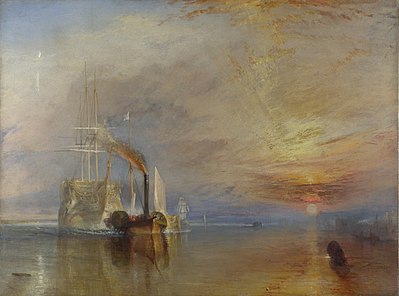
|
HMS Temeraire was a 98-gun Royal Navy ship of the line. Built at Chatham Dockyard and launched in 1798, she served during the French Revolutionary Wars and the Napoleonic Wars, mostly on blockades or convoy escort duties. She fought only one fleet action, the Battle of Trafalgar of 1805, in which she went into action immediately astern of Horatio Nelson's flagship, HMS Victory. During the battle, Temeraire came to the rescue of the beleaguered Victory and fought and captured two French ships, winning public renown in Britain. This picture, titled The Fighting Temeraire, is an oil-on-canvas painting by J. M. W. Turner that depicts the ship being tugged to be broken up in 1838. Turner's painting achieved widespread critical acclaim and received accolades from the likes of John Ruskin and William Makepeace Thackeray. It hangs today in the National Gallery in London and was voted the nation's favourite painting in a poll organised by BBC Radio 4's Today programme in 2005. Painting credit: J. M. W. Turner
Recently featured:
|
May 7
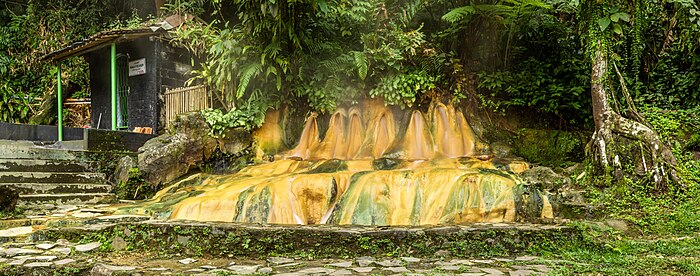
|
|
Pancuran Tujuh (Indonesian for 'Seven Springs') is a hot spring located on the slopes of Mount Slamet in the Banyumas Regency of Indonesia's Central Java province. Local people believe that the hot spring and its sulfuric waters contain healing properties. According to legend, the springs were discovered by a man named Syekh Maulana Maghribi. Sailing to Gresik on Java to spread Islam, he and a follower spotted a strange light. The legend then tells that they followed the light, landing at Pemalang and continuing overland, but Maghribi fell ill with a strange skin condition and received a vision that he had to climb the southern mountains to treat it. Finding Pancuran Tujuh, he treated himself by bathing in the waters. Photograph credit: Chris Woodrich
Recently featured:
|
May 8

|
The Japanese yen (denoted by the ¥ symbol) is the official currency of Japan. It is the third most traded currency in the foreign exchange market, after the United States dollar and the euro; it is also widely used as a reserve currency. The concept of the yen was a component of the Meiji government's modernization program of Japan's economy, which postulated the pursuit of a uniform currency throughout the country, modelled after the European decimal currency system. Before the Meiji Restoration, Japan's feudal fiefs all issued their own money, hansatsu, in an array of incompatible denominations. The New Currency Act of 1871 did away with these and established the yen. The Bank of Japan was later founded in 1882 and given a monopoly on controlling the money supply. This picture shows the obverse (top) and reverse (bottom) sides of a one-yen banknote of the Meiji era constitutional monarchy, dated 1873, which was the second year of issue for yen banknotes. The banknote was engraved and printed by the Continental Bank Note Company (later part of the American Bank Note Company) of New York and is now in the National Numismatic Collection of the National Museum of American History, part of the Smithsonian Institution. Banknote credit: Continental Bank Note Company
Recently featured:
|
May 9

|
John Murray, 4th Earl of Dunmore (1730–1809), generally known as Lord Dunmore, was a Scottish peer and colonial governor in the American colonies and The Bahamas. He was the last British colonial governor of Virginia, from 1771 to 1775. This picture is an oil-on-canvas portrait of Dunmore by the English painter Sir Joshua Reynolds, dated 1765. He is depicted in the Highland dress of the 3rd Regiment of Foot Guards. The painting is now in the collection of the Scottish National Gallery in Edinburgh. Painting credit: Joshua Reynolds
Recently featured:
|
May 10

|
A ceremony marking the completion of the First Transcontinental Railroad was held at Promontory Summit in the Utah Territory on May 10, 1869. The route, formed by the joining of the Central Pacific Railroad and the Union Pacific Railroad, enabled passenger and freight trains to travel between the east and west coasts of North America and was immensely beneficial to the development of the western United States. To commemorate the occasion, a 17.6-karat gold final spike was driven in by Leland Stanford to connect the rails of both lines. This picture, titled East and West Shaking Hands at Laying Last Rail, was taken by American photographer Andrew J. Russell. It shows the teams from both railroads after the ceremony, with Samuel S. Montague (center left) of the Central Pacific Railroad shaking hands with Grenville M. Dodge (center right) of the Union Pacific Railroad, both chief engineers of their respective railroads. The photograph is in the collection of the Beinecke Rare Book & Manuscript Library at Yale University. Photograph credit: Andrew J. Russell; restored by Adam Cuerden
Recently featured:
|
May 11

|
Minnesota is a state in the Midwestern United States, carved out of the eastern half of the Minnesota Territory and admitted to the Union as the 32nd state on May 11, 1858. While the state's residents are primarily white and northern European, substantial influxes of African, Asian and Hispanic immigrants have joined the descendants of European immigrants and of the original Native American inhabitants. Nearly 60 percent of Minnesota's residents live in the Minneapolis–Saint Paul metropolitan area, known as the Twin Cities. The remainder of the state, often referred to as Greater Minnesota, consists of western prairies now given over to intensive agriculture; eastern deciduous forests, also heavily farmed and settled; and the less-populated North Woods. The state, known as the "Land of 10,000 Lakes", is known for its moderate-to-progressive politics and social policies, its civic involvement and its high voter turnout. This picture is a depiction of the historical coat of arms of Minnesota, illustrated by American engraver Henry Mitchell as part of State Arms of the Union, published in 1876 by Louis Prang. The escutcheon features a Native American riding on horseback in the background, while a farmer plows a field in the foreground, with his rifle resting on a stump nearby; these represent the state's peoples and industries. The French motto below the shield reads L'Étoile du Nord, meaning 'The Star of the North'. Illustration credit: Henry Mitchell; restored by Andrew Shiva
Recently featured:
|
May 12
Subpage 1

|
The Hungarian Parliament Building is the seat of the National Assembly of Hungary. It lies in Budapest's Kossuth Square, on the bank of the Danube. One of the city's popular tourist destinations, it is the largest building in Hungary and the tallest in Budapest. The building was designed by Hungarian architect Imre Steindl in neo-Gothic style and opened in 1902. This picture, taken in 2015, shows the building in the late afternoon. See also: a picture of the building at dawn Photograph credit: Andrew Shiva
Recently featured:
|
Subpage 2

|
The Hungarian Parliament Building is the seat of the National Assembly of Hungary. It lies in Budapest's Kossuth Square, on the bank of the Danube. One of the city's popular tourist destinations, it is the largest building in Hungary and the tallest in Budapest. The building was designed by Hungarian architect Imre Steindl in neo-Gothic style and opened in 1902. This picture, taken in 2015, shows the building at dawn. See also: a picture of the building in the late afternoon Photograph credit: Andrew Shiva
Recently featured:
|
May 13

|
Anne Duvivier, comtesse de Vergennes (1730–1798), also known as Annette Duvivier or de Viviers, was the wife of the French statesman and diplomat Charles Gravier, comte de Vergennes, ambassador to the Ottoman Empire. Her first marriage was to Francesco Testa, a merchant and member of one of the oldest Latin families of Péra, but she was widowed at the age of 24. She then lived as Gravier's mistress for some time before the couple married without the consent of King Louis XV, for which he was later recalled. They went on to have two daughters. This picture is an oil-on-canvas portrait of Duvivier by the French painter Antoine de Favray from the second half of the 18th century, titled Portrait of the Countess of Vergennes in Turkish Attire. She is portrayed on a divan in oriental costume, shortly before she married Gravier. The painting now hangs in the Pera Museum in Istanbul. Painting credit: Antoine de Favray
Recently featured:
|
May 14
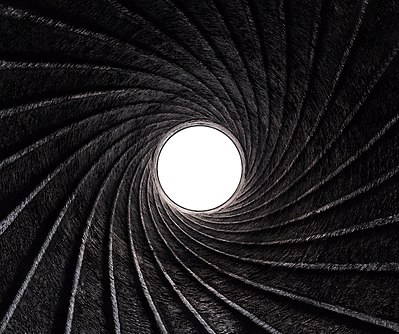
|
In firearms, rifling is the helical groove pattern that is machined into the internal (bore) surface of a gun's barrel, for the purpose of exerting torque and thus imparting a spin to a projectile around its longitudinal axis during shooting. This spin serves to gyroscopically stabilize the projectile by conservation of angular momentum, improving its aerodynamic stability and accuracy over smoothbore designs. This picture, taken in 2016, shows the conventional rifling of an Austro-Hungarian 90 mm (3.5 in) M75 cannon, manufactured in 1891, on display at Ljubljana Castle in Slovenia. Photograph credit: Petar Milošević
Recently featured:
|
May 15
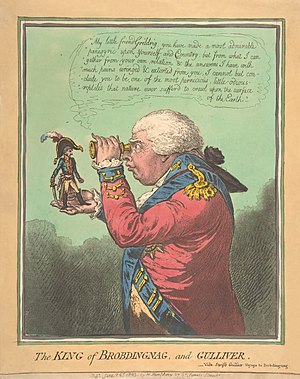
|
The King of Brobdingnag and Gulliver is a satirical print produced in 1803 by British caricaturist and printmaker James Gillray, executed in etching and aquatint. It is based on the fictional land of Brobdingnag from Jonathan Swift's 1726 novel Gulliver's Travels, which is inhabited by giants. The print shows a profile of George III of the United Kingdom, representing the Brobdingnagian king, holding a miniature Napoleon, representing Gulliver, while observing him through a spyglass. It was published on 26 June, five weeks after the breakdown of the Treaty of Amiens, which precipitated the Napoleonic Wars. The king's speech balloon in the top half of the print reads "My little friend Grildrig, you have made a most admirable panegyric upon Yourself and Country, but from what I can gather from your own relation & the answers I have with much pains wringed & extorted from you, I cannot but conclude you to be one of the most pernicious, little-odious-reptiles, that nature ever suffer'd to crawl upon the surface of the Earth". This copy of the print is in the collection of the Metropolitan Museum of Art in New York. Print credit: James Gillray; restored by Chris Woodrich
Recently featured:
|
May 16
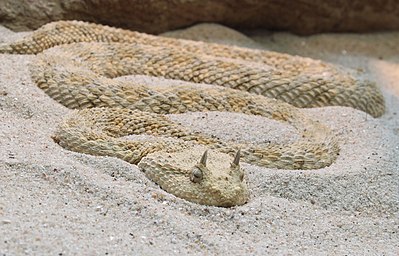
|
Cerastes cerastes, commonly known as the Saharan horned viper or the horned desert viper, is a venomous viper species native to the deserts of northern Africa and parts of the Middle East. It commonly has a pair of supraocular "horns", although hornless individuals do occur. The colour pattern consists of a yellowish, pale grey, pinkish, reddish or pale brown ground colour, which almost always matches the substrate colour where the animal is found. Dorsally, a series of dark, semi-rectangular blotches runs the length of the body. The belly is white and the tail, which may have a black tip, is usually thin. Photograph credit: Holger Krisp
Recently featured:
|
May 17
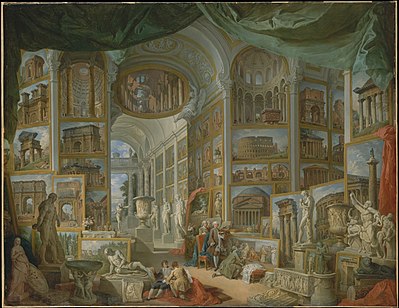
|
Ancient Rome is a name given to each of three almost identical paintings by Italian artist Giovanni Paolo Panini, produced as pendant paintings to Modern Rome for his patron, the comte de Stainville, in the 1750s. The paintings depict many of the most significant architectural sites and sculptures from ancient Rome, such as the Colosseum, the Pantheon, Laocoön and His Sons, the Farnese Hercules, the Apollo Belvedere and the Borghese Gladiator. Both Panini and Stainville are featured in the paintings; Stainville stands holding a guidebook, while Panini appears behind Stainville's armchair. This picture shows the second version of the work, held in New York's Metropolitan Museum of Art, painted in oil on canvas and dated 1757. The other two versions are in the Staatsgalerie Stuttgart and the Louvre in Paris. Painting credit: Giovanni Paolo Panini
Recently featured:
|
May 18

|
Jack Johnson (born 1975) is an American singer-songwriter, known primarily for his work in the soft rock and acoustic genres. Born on the Hawaiian island of Oahu, Johnson started out as a surfer, making the finals of the Pipeline Masters competition at the age of 17, but his career was cut short by an accident. In 2001, he achieved commercial success after the release of his debut album, Brushfire Fairytales. Johnson has reached number one on the Billboard 200 chart with his albums Sing-A-Longs and Lullabies for the Film Curious George in 2006, Sleep Through the Static in 2008, To the Sea in 2010 and From Here to Now to You in 2013. His album In Between Dreams peaked at number two on the chart in 2005 and again in 2013. Johnson is also active in environmentalism and sustainability, often with a focus on the world's oceans. This picture, taken in 2014, shows Johnson in performance at the Waikiki Shell in Honolulu, Hawaii. Photograph credit: Peter Chiapperino
Recently featured:
|
May 19

|
The North American B-25 Mitchell is an American twin-engine medium bomber manufactured by North American Aviation (NAA). The design was introduced in 1941 and named in honor of Major General William "Billy" Mitchell, a pioneer of U.S. military aviation. Used by many Allied air forces, the B-25 served in every theater of World War II. After the war ended, many remained in service, operating across four decades. Produced in numerous variants, nearly 10,000 B-25s were made. These included a few limited models, such as the United States Marine Corps' PBJ-1 patrol bomber, as well as the F-10 reconnaissance aircraft and the AT-24 trainers used by the United States Army Air Forces. This picture, taken in 2007, shows a B-25J operated by the United States Air Force, nicknamed Russell's Raiders, at the annual International Air Picnic in Góraszka, Poland. Photograph credit: Lukas skywalker
Recently featured:
|
May 20

|
The bee-eaters are a group of near passerine birds in the family Meropidae, containing three genera and twenty-seven species. Most species are found in Africa and Asia, with a few in southern Europe, Australia and New Guinea. They are characterised by richly coloured plumage, slender bodies and usually elongated central tail feathers. All have long down-turned bills and medium to long wings, which may be pointed or round. Male and female plumages are usually similar. As their name suggests, bee-eaters predominantly eat flying insects, especially bees and wasps, which are caught in the air by flights from an open perch. The stinger is removed by repeatedly hitting and rubbing the insect on a hard surface. During this process, pressure is applied to the insect, thereby extracting most of the venom. This composite, taken in 2016, shows six bee-eaters of the genus Merops found in Africa. Clockwise from top left, the species depicted are the blue-cheeked bee-eater (M. persicus chrysocercus), the cinnamon-chested bee-eater (M. oreobates), the little bee-eater (M. pusillus pusillus), the white-throated bee-eater (M. albicollis), the swallow-tailed bee-eater (M. hirundineus chrysolaimus) and the European bee-eater (M. apiaster). Photograph credit: Charles J. Sharp
Recently featured:
|
May 21

|
The Annunciation is an oil-on-oak panel painting attributed to the Early Netherlandish painter Hans Memling. It depicts the Annunciation, the announcement by the archangel Gabriel to the Virgin Mary that she would conceive and become the mother of Jesus, described in the Gospel of Luke. Completed c. 1482, it was partially transferred to canvas in the 1920s. The panel shows Mary in a domestic interior with two attendant angels; Gabriel is dressed in ecclesiastical robes, while a dove representing the Holy Spirit hovers above Mary. It expands upon the Annunciation wing of Rogier van der Weyden's c. 1455 Saint Columba Altarpiece. According to art historian Maryan Ainsworth, the work is a "startlingly original image, rich in connotations for the viewer or worshiper". The painting is held in the Robert Lehman collection of the Metropolitan Museum of Art in New York. Painting credit: Hans Memling
Recently featured:
|
May 22

|
Uppsala Cathedral is a cathedral in central Uppsala, belonging to the Church of Sweden, the Lutheran national church. It is the seat of the Archbishop of Uppsala, the primate of Sweden, currently Antje Jackelén. The cathedral dates to the late 13th century and was designed in the French Gothic style. With a height of 118.7 metres (389 ft), it is the tallest church in the Nordic countries. Originally built under Roman Catholicism, it was used for the coronations of Swedish monarchs for a lengthy period following the Protestant Reformation. Some of its chapels were converted to house the tombs of monarchs, including Gustav Vasa and John III. Carl Linnaeus, Olaus Rudbeck, Emanuel Swedenborg and several archbishops are also buried there. This picture shows the cathedral from the rear, undergoing restoration by architect Helgo Zettervall in 1889. It was taken by Emma Schenson, an early female professional photographer in Sweden. The photograph is in the collection of the Uppsala University Library. Photograph credit: Emma Schenson; restored by Adam Cuerden
Recently featured:
|
May 23
Subpage 1

|
Arena Glacier is a glacier located on Trinity Peninsula, the northernmost region of the Antarctic Peninsula. The glacier is 3 miles (5 km) long and flows northeast from Mount Taylor into Hope Bay, 2 miles (3 km) southwest of Sheppard Point. The Falkland Islands Dependencies Survey mapped the area in 1948 and 1955. They also chose the name Arena Glacier, due to the flat ice floor in the upper half, which was surrounded by the steep slopes of the Twin Peaks, Mount Taylor and Blade Ridge, resembling an arena. This photograph, taken in 2016, is a view at a distance, showing the glacier flowing into Hope Bay. See also: a close-up view, approaching the glacial outlet Photograph credit: Andrew Shiva
Recently featured:
|
Subpage 2
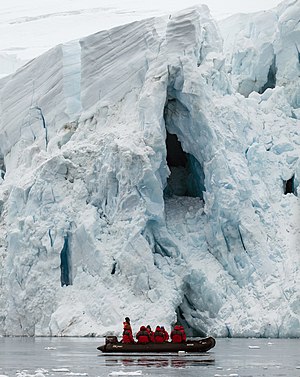
|
Arena Glacier is a glacier located on Trinity Peninsula, the northernmost region of the Antarctic Peninsula. The glacier is 3 miles (5 km) long and flows northeast from Mount Taylor into Hope Bay, 2 miles (3 km) southwest of Sheppard Point. The Falkland Islands Dependencies Survey mapped the area in 1948 and 1955. They also chose the name Arena Glacier, due to the flat ice floor in the upper half, which was surrounded by the steep slopes of the Twin Peaks, Mount Taylor and Blade Ridge, resembling an arena. This photograph, taken in 2016, is a close-up view, approaching the glacial outlet. A Zodiac is shown in front of the glacier, providing a perspective of size. See also: a view at a distance, showing the glacier flowing into Hope Bay Photograph credit: Andrew Shiva
Recently featured:
|
May 24

|
Joseph F. Ambrose (May 24, 1896 – May 1, 1988), nicknamed "Doughboy Joe", was a U.S. World War I veteran who served in Company I, 140th Infantry, 35th Division, in the American Expeditionary Forces. Born in Joliet, Illinois, he was drafted into the United States Army in 1917 and served until 1919. Ambrose became nationally known for this photograph, circulated by the Defense Audiovisual Agency, depicting him attending the dedication day parade for the Vietnam Veterans Memorial in Washington, D.C., on November 13, 1982, at the age of 86. He was photographed wearing his Doughboy uniform, helmet and field equipment, as well as carrying the American flag that had covered the casket of his son, Clement A. Ambrose, who was killed in the Korean War in 1951. The photograph is in the collection of the National Archives at College Park. Photograph credit: Mickey Sanborn
Recently featured:
|
May 25
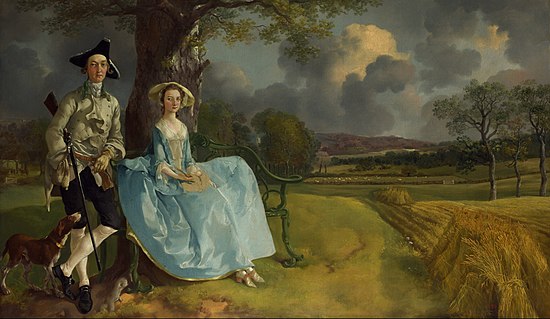
|
|
Mr and Mrs Andrews is an oil-on-canvas painting by English artist Thomas Gainsborough, painted around 1750. It is a conversation piece, a genre of art in which a group of subjects are shown with other elements and activities. The subjects of the picture are Robert Andrews, a member of the landed gentry from the town of Bulmer in Essex, depicted in a loose hunting coat, as well as his wife, Frances Andrews (née Carter), a woman from the same parish, depicted in an informal summer suit with a straw hat. The couple are shown in a landscape near their estate, Auberies, in Bulmer Tye. The work is unusual for an outdoor conversation piece, in that the background setting is agricultural, rather than the gardens of the subjects' own houses. This may have been motivated by Gainsborough's love of landscape painting, as well as the couple's desire to make a more prominent display than was normal in a portrait of the country estate that had formed part of Mrs Andrews's dowry. The painting remained in the Andrews family until 1960 and was very little known before it appeared in an exhibition in Ipswich in 1927, after which it was regularly requested for other exhibitions in Britain and abroad, while also praised by critics for its charm and freshness. It now hangs in the National Gallery in London. Painting credit: Thomas Gainsborough
Recently featured:
|
May 26

|
|
An aerial view of the Field of Mars, a large park in central Saint Petersburg, Russia, pictured in 2016. It is named after Mars, the Roman god of war. The park's history goes back to the 18th century, when it was converted from bogland and named the Grand Meadow. Later, it was the setting for celebrations to mark Russia's victory over Sweden in the Great Northern War. Its next name, the Tsaritsyn Meadow, appears after the royal family commissioned Francesco Bartolomeo Rastrelli to build the Summer Palace for Empress Elizabeth. It became the Field of Mars during the reign of Paul I. Towards the end of the 18th century, the park became a military drill ground, where they erected monuments commemorating the victories of the Russian Army and where parades and military exercises took place regularly. After the February Revolution in 1917, the Field of Mars became a memorial area for the revolution's honoured dead. In the summer of 1942, as the city was besieged by the German army in the Siege of Leningrad, the park was covered with vegetable gardens to supply food. An eternal flame was lit in the centre of the park in 1957, in memory of the victims of various wars and revolutions. Photograph credit: Andrew Shiva
Recently featured:
|
May 27

|
George Washington Carver (1860s–1943) was an American agricultural scientist and inventor. Born into slavery in Diamond, Missouri, he was raised by his master Moses Carver after being emancipated, having been separated from his parents as an infant during a kidnapping incident. After college, Carver became a professor at Tuskegee Institute, where he developed techniques to improve soils depleted by repeated plantings of cotton. He wanted poor farmers to grow alternative crops, such as peanuts and sweet potatoes, as a source of their own food and to improve their quality of life. Carver spent years developing and promoting products made from peanuts, although none became commercially successful. Apart from his work to improve the lives of farmers, he was also a leader in promoting environmentalism. Carver received numerous honors for his work, including the NAACP's Spingarn Medal. In an era of very high racial polarization, his fame reached beyond the black community; he was widely recognized and praised in the white community for his many achievements and talents. In 1941, Time magazine dubbed Carver a "black Leonardo". This picture of Carver was taken around 1910 and is in the collection of the Tuskegee University archives. Photograph credit: Unknown; restored by Adam Cuerden
Recently featured:
|
May 28

|
The Allegory of Prudence is an oil-on-canvas painting attributed to the Italian painter Titian and his assistants, dated around 1565 to 1570. It depicts three human heads, representing youth, maturity, and old age, above three animal heads. Both sets of heads face in different directions, which reflects the concepts of past, present and future. Scholars believe that the first of the three human heads is an elderly Titian, while the other two are his son Orazio Vecellio and his young nephew Marco Vecellio, both of whom lived and worked with him. A barely visible inscription across the top of the painting, from which the work acquired its present name, reads Ex praeterito praesens prudenter agit, ni futura actione deturpet (Latin for 'From the experience of the past, the present acts prudently, lest it spoil future actions'). The painting is now in the collection of the National Gallery in London. Painting credit: Titian
Recently featured:
|
May 29

|
South Carolina is a state in the Southeastern United States and the easternmost of the Deep South. It became the eighth state to ratify the Constitution, on May 23, 1788, as well as the first to vote in favor of secession from the Union, on December 20, 1860. After the American Civil War, the state was readmitted to the Union on June 25, 1868. The state capital is Columbia, while the largest city is Charleston. South Carolina is named in honor of King Charles I of England, who first formed the English colony in 1629. From east to west, the state can be divided into three main geographic areas: the Atlantic coastal plain (also known as the Lowcountry), the Piedmont and the Blue Ridge Mountains. This picture is a depiction of the historical coat of arms of South Carolina, illustrated by American engraver Henry Mitchell as part of State Arms of the Union, published in 1876 by Louis Prang. The left ellipse shows a tall palmetto and a fallen oak, respectively representing the victorious defenders and the British fleet at the Battle of Sullivan's Island, with the Latin motto Animis opibusque parati ('Prepared in mind and resources'). The right ellipse depicts the Roman goddess Spes, representing hope, with the sun rising behind her and the Latin motto Dum spiro spero ('While I breathe, I hope'). The supporters are a personification of Liberty on the left and a Continental soldier on the right, while Fame goes from Liberty to the soldier above. Part of this design also appears in the seal of South Carolina. Illustration credit: Henry Mitchell; restored by Andrew Shiva
Recently featured:
|
May 30

|
Alessandro Martinelli (born 30 May 1993) is a Swiss professional footballer who plays as a midfielder for Serie B club Brescia. Born in Mendrisio, Ticino, he moved south to Italy to begin his professional career in 2009. Martinelli then left the reserve team of Sampdoria in 2012 for Portosummaga. After returning to Sampdoria in 2013, he was signed by Venezia later that year and then by Modena in 2014. Martinelli left for Brescia in 2015 and joined the club on a permanent basis in 2017. From 2008 to 2013, he also played for various Swiss national youth football teams. This picture, taken in 2015, shows Martinelli playing for Modena in a match against Ternana. Photograph credit: Matteo Brama
Recently featured:
|
May 31

|
Chien-Shiung Wu (May 31, 1912 – February 16, 1997) was a Chinese-American experimental physicist who made significant contributions in the field of nuclear physics. Wu worked on the Manhattan Project, where she helped develop the process for separating uranium into uranium-235 and uranium-238 isotopes by gaseous diffusion. She is best known for conducting the Wu experiment, which proved that parity is not conserved. This discovery resulted in her colleagues Tsung-Dao Lee and Chen-Ning Yang winning the 1957 Nobel Prize in Physics, while Wu herself was awarded the inaugural Wolf Prize in Physics in 1978. Her expertise in experimental physics evoked comparisons to Marie Curie. Her nicknames include the "First Lady of Physics", the "Chinese Madame Curie" and the "Queen of Nuclear Research". This picture, taken in 1963, shows Wu in her laboratory at Columbia University in New York, while she was professor of physics there. The photograph is in the collection of the Smithsonian Institution Archives. Photograph credit: Science Service, Smithsonian Institution; restored by Adam Cuerden
Recently featured:
|
Picture of the day archives and future dates